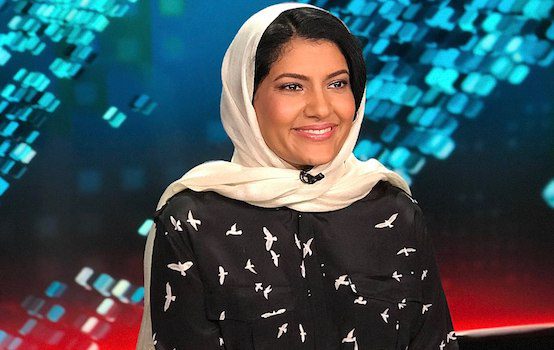Saudi Arabia’s Princess Ambassador: Progress or Symbolism?

It was hard not to be optimistic when Saudi Arabia appointed Princess Reema bin Bandar, a former business executive and philanthropist who lived in the United States for decades, to be its next ambassador to Washington.
Reema’s pedigree is impressive. Her father, Prince Bandar bin Sultan, was the longest tenured Saudi ambassador to the United States in history, serving for 22 years until 2005. Like her father, Reema was educated in America, graduating from George Washington University in 1999. Here’s more from her bio:
After returning to the Kingdom in 2005, and spending time as the CEO of Harvey Nichols in Riyadh, the princess launched a handbag brand in 2013, before founding a private equity fund and a women’s day spa. She is a member of the World Bank’s Advisory Council for its Women Entrepreneurs Finance Initiative, is vice president of women’s affairs at the General Sports Authority, and is a founding member of the Zahra Breast Cancer Association in Riyadh. In August 2018 she was also appointed to the International Olympic Committee.
Yet Reema has never served in any diplomatic post or job. Traditionally, Saudi ambassadors are required to have experience in some prior diplomatic post. But Reema is a loyalist to the Al Saud clan, so apparently that requirement has been scuttled.
And as we know, the Saudis, and particularly the royal family, are working overtime to clean up their image. Between the brutal murder of journalist Jamal Khashoggi, the bloody Saudi-led military campaign in Yemen, the funding of fundamentalist Islamic clerics, and the discovery that three quarters of the 9/11 hijackers were Saudi, Saudi Arabia has gone from being a solid ally of the United States to an international problem child.
America has enjoyed an important and valuable strategic partnership with the Saudis. They buy our weapons and commercial airplanes, they sell us oil, and they host one of our key military bases in their kingdom. But at the same time, they often seem to be playing us, rather than following through on their stated intentions of stopping terrorism and promoting basic human rights.
While the Khashoggi murder was the most recent high-profile case involving the Saudis, the arrest and imprisonment of women’s rights activists across Saudi Arabia (at the same time that Crown Prince Mohammed bin Salman was promising unprecedented reforms) caused an international uproar as well. At least 11 such activists were imprisoned and allegedly tortured.
Women in Saudi Arabia have of course won some symbolic victories, and none more impressive than Princess Reema bin Bandar being appointed ambassador to the United States. According to a 2014 profile in Fast Company, when she was running the British luxury department store chain Harvey Nichols in Riyadh, she fired male salesmen to make way for female employees. “Our society tends to change a bit slower than others,” Reema said in that profile. “We have to explain to people that it’s evolution, not Westernization.”
This is no small step for a fundamentalist Islamic country, but it shouldn’t blind the world to the second-class status that still afflicts women in Saudi Arabia. While Reema’s appointment gives the appearance of Saudi empowerment, Saudi law still considers women subservient to men, and women still need approval from male caretakers for almost every big decision they make.
The new ambassador has some tough work ahead of her. And while most will look at her appointment as a net positive, we can’t let it whitewash the challenges that still exist for the overwhelming majority of women living in Saudi Arabia and the Middle East. We must encourage openness, equality, and basic human rights at every level, while at the same time respecting the sovereignty, traditions, and religions of other cultures.
Let us also acknowledge that the issues between Saudi Arabia and the United States are today fraught with tension—particularly on the Yemen war and keeping a semblance of balance among various rivals in the Middle East. Saudi Arabia may be trying to score points, but it remains to be seen whether Reema is the right diplomat for the job.
Saul Anuzis is a political consultant, the former chairman of the Michigan Republican Party, and a former member of the Republican National Committee.
Comments